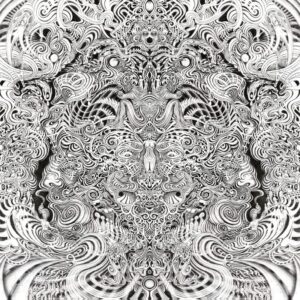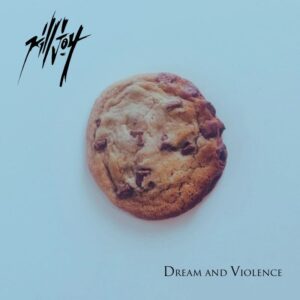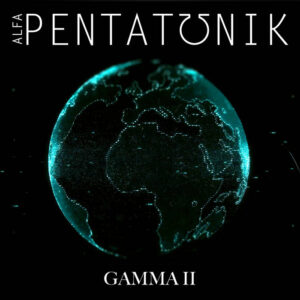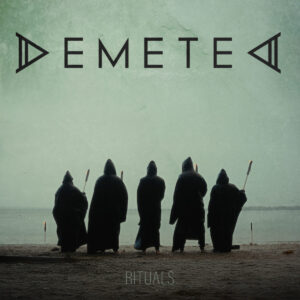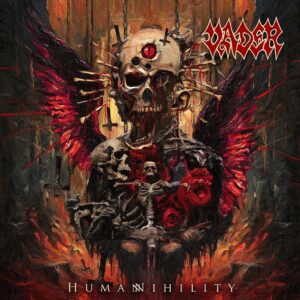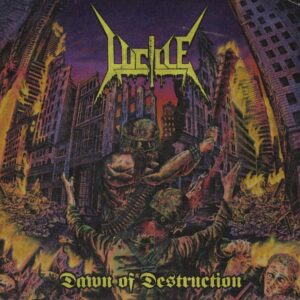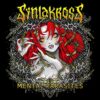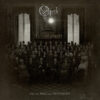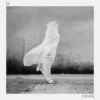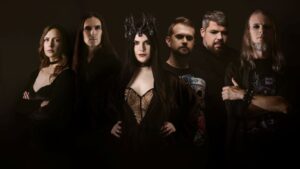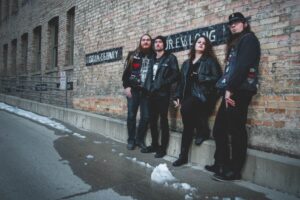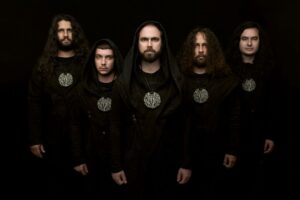Foued Moukid, Abder Abdellahoum
Arkan
•
July 16, 2008
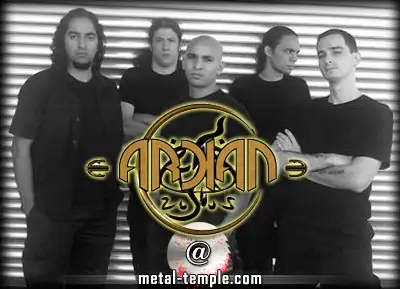
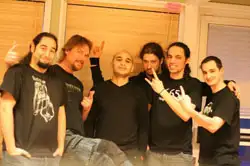
[Foued]: ARKAN was born from the meeting between Abder and me. I was then THE OLD DEAD TREE's drummer, we wanted to mix music that we were fond of: Metal, with our oriental and North African origins. Then Mus and Samir, former members of WORTH, an Algerian band of Death Metal, and Florent, former member of WHISPER-X joined us. They were having the same need to experiment something new. We first released our first EP Burning Flesh which is a 20 minutes of Death metal basis music mixed with some eastern moods.
For several months, we played on stage to promote it. At the same time, we were preparing our first album Hilal which is an exaggeration of Burning Flesh's elements. In the beginning it was a side project were we could express that side of our musical personalities. Later on we were so involved in ARKAN that we decided to concentrate exclusively on it, leaving one after the other our former bands.
[Foued]: We are very satisfied. Hilall is greeted in very different ways depending on the country but remains a good surprise. We do not yet have the hindsight of course; its release remains fairly recent. But the views of listeners and journalists were unanimous and we're very proud. We look forward to presenting the album on stage. What pleasantly surprised us is that whatever the country is, chronicles are very good and very encouraging, and our music seems to appeal. This confirms that metal is a very open and tolerant style.
[Abder]: Yes absolutely, we had some nice reviews from webzines and magazines across Europe. We are very satisfied the way Hilal is welcomed. So far we feel that most of people understand our musical message and the things we wanted to get through this album. It's an achievement for us after so much work.
[Foued]: There is no connection with any religion, Hilal means crescent moon, the album's concept deals with the lifestyle and the beliefs of the people of Mesopotamia in the ancient time and The fertile crescent was the name given to this region of the globe back then.
Beyond that Hilal has a double meaning. It represents a powerful symbol in the Arab culture and civilization. It is also present in the form of eclipse in our logo. The crescent is a sort of transition between two extreme states. We want to link to our way between these two poles that represent the extreme south and the north and in this way metal music and Eastern-North African music.
[Abder]: It's a mix between a modern and powerful melodic Death metal -with both extreme and clean vocals, melodic lead guitars and a strong rhythm section- and oriental music in the broadest sense. You can find different sides and origins of the oriental music like Andalusia, Maghreban Chaabi, Egyptian and even Middle Eastern style. We used the oriental music through the musical scales and modes, but also through the multitude of instruments that it was possible to use and that were in the musical background of our origins, like the Oud or the Derbouka. There are also Arabian male and female vocals, epic parts with choirs and orchestrations, some other atmospheric, and also pure acoustic songs and passages.
[Foued]: At first, we were isolated during the composition process of the album since we needed to be removed from the world in order to not being influenced, especially musically. The lyrics on it were written almost simultaneously. The most difficult part however remained the arrangements part, since cohesion is an important element of the album. The composition of the pieces was randomly based on Death metal or acoustic. It took us a long time and much patience to achieve a complete uniformity.
The integration of many other instruments was made naturally because we are able to play these instruments. But when it came to the vocals it was more difficult especially with the female singing part. We casted a large number of singers before finding out the right one.
[Abder]: Indeed, it had not been easy… but we were proceeding according to a plan that had been established at the outset of the composition of the album.
We first set the songs' general structures, which had to stick to a clear path to get in tune with the album's concept which tells a story. It is a concept-album that leads us, sometimes, to delete irrelevant parts by their musical consistence.
[Abder]: We knew exactly, from the start, what Fredrik Nordstrom was capable of in terms of musical production. While composing our album we had some idea of the sound it would have. We wanted to have a production that meets the requirements in terms of power and clarity, especially when our music gets sophisticated sometimes. There was no better producer for us who could transcribe the power and melody of ARKAN's music than Fredrik for us.
[Foued]: When I contacted Fredrik with two pre-produced pieces of the album, he listened to them and said: I like that kebab boogie music! We immediately liked each other. He is a legend for us and we wanted to work with him, it was like something inaccessible. After we contacted him he was invested heavily in the album very quickly. When we arrived at the studio, some recordings were done in Algeria, but we brought with us traditional instruments that we wanted to record there. When he saw my percussions, he said: What do you want to do with your funny toms? I have been struggling to convince him to use my percussions on the recording because it was something new for him. In the end, he confided in us and the result was quite amazing, he is and remains the absolute master of his thing.

[Abder]: The spoken parts on the album deal each time with the subject of the song it appears in. In the case of Mistress Of The Damned Souls it's a description of Erishkigal's realm, which is one of the Sumerian divinities that Hilal deals with in its description of the ancient beliefs. The spoken parts add an atmospheric mood to the whole when it's coupled with the female dreamy vocals; we found it interesting to use Arabic speech to increase and strengthen the oppressive atmospheres.
[Foued]: ARKAN's music is meant to be a merger between the metal and the music of our origins. What then could be more natural than to cover a great standard of the eastern music Lamma Bada Yatathana? To achieve this piece, we played over the Oud melodic lines of this standard; we call for an Oriental singer to faithfully reproduce the original version. This piece therefore symbolizes the common ground that unites us all around this project. Its subject deals, in the album's concept, with the meeting of the elements and the beauty of nature before the wrath of the Gods against men and their decadent lifestyle in the Sumerian mythology.
[Foued]: Our music is basically a live music, the album being just a mean of promoting the band. Of course the titles include varieties of sounds and instruments so it is difficult to reproduce them simultaneously on stage other than using music samples. Though, we play as many instruments as possible in order to remain faithful to the band spirit.
It will depend on the live conditions; the better the conditions will be the more we'll play instruments. For our upcoming gig in Paris next fall we plan to invite on stage two vocalists and instrumentalists to reproduce the whole album. For gigs that will not permit, we plan to use the audio samples which is an extraordinary means to reproduce the Eastern instruments simultaneously.
[Abder]: The openness plays a large role in our composition process; therefore we try to put together different ingredients and see what happens! Take the intro of the song Defying The Idols which is an electro-beat rhythm with a mandola playing along, or the epic part of the song Lords Decline where you can hear a choir singing along a blast beat section. We have a big inspiration coming from oriental music, and an even bigger from Metal of course, beyond that, we have other musical horizons we can draw our inspiration of to make interesting combinations, like classical music or world music. To tell the truth, there are no boundaries set to our references.
Talking about oriental music for instance; we have a big inspiration coming from Eastern artists like Oum Kelthoum, Farid El Atrache, Abdelhalim Hafedh and other North African like Hadj El Anka and Dahmane El Harrachi.
[Abder]: It's a team work. We have tried to link each process so that the particular theme of the lyrics can stick to the spirit of the music. We absolutely stick to what each member brings with his personal touch to the band's music. The musical result is the perfect reflection of our personal musical history, whether in metal or in the Arabic music by the way. For words the theme required some researches, especially on the Sumerian mythology. This became the singer's work that has been able to explain the themes that bind the words of Hilal after several weeks. This composition process has a lot of defects because the work is much longer and it requires a lot of compromises. The end result brings so much richness and originality that it is a necessary evil.
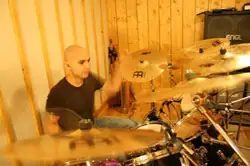
[Foued]: The record labels are actually more and more requiring. It is so easy to record an album today that the process of selection could only be done by the recording companies. When you're a young band and you need to stand out by your music, by the quality of your production and by your knowledge of performance and on your professionalism. The record labels judge everything in general before betting on a band. This process is understandable since the investment is so important on a first album. ARKAN is fortunate to have good relationship with Season of Mist. Recording at The Fredman Studio has reinforced the record label of our professionalism.
The metal scene in France is boiling; very good bands have already pulled their music outside its boundaries and our generation looks forward to the opportunity of showing all the richness of French metal across Europe.
[Foued]: The question does not arise in those terms. We have several sources of income and for the moment, we do not rely on selling albums or concerts for living. Fortunately, we opted for financial autonomy so that our music is not corrupted by the needs of profitability. When you make music for living, you are sometimes forced to bow to trends so your music remains attractive. In our case, we prefer to earn few amounts of money with our music but the music we enjoy and which characterizes us most. Now if we sell millions… I won't say no!
[Foued]: We are awaiting the feedbacks after the release of the album to get the opportunities to open European gigs that are being booked for the end of the year or early next year. For France, we plan to hit the road early 2009 and pass through the biggest cities. We will also try to participate to the most of the European festivals.
[Foued]: Thank you for your interview, if you want to catch us on tour you can keep yourself informed by visiting our official website at www.ARKAN.fr or our MySpace page: www.myspace.com/ArkanBand
[Abder]: Thanks for the interview and greetings to the Metal-Temple readers.
More results...
